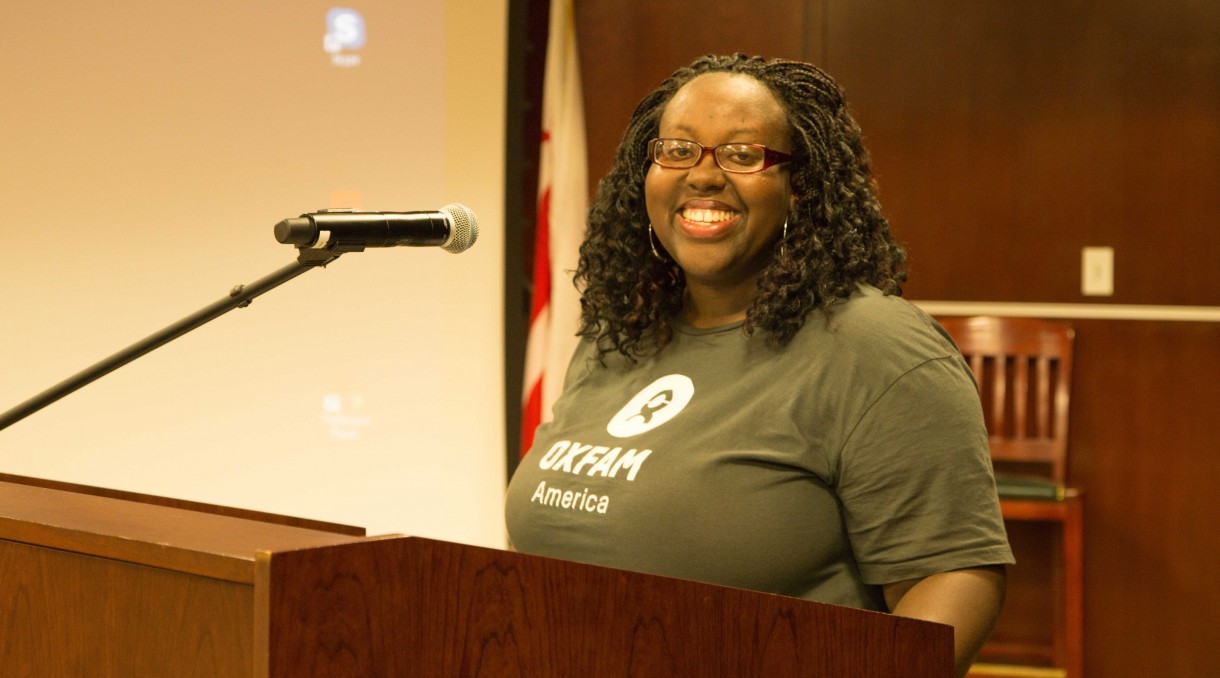Green Climate Fund brings a little optimism
 Oxfam Action Corps members with the banner they used to collect signatures at a film screening and panel discussion about climate change in October, 2015, in Washington, DC. Photo by Tapan Bhargava
Oxfam Action Corps members with the banner they used to collect signatures at a film screening and panel discussion about climate change in October, 2015, in Washington, DC. Photo by Tapan Bhargava
I frequently worry about how poor farmers will adapt to climate change, but recent legislation gives me hope that there will be resources to help them.
Elizabeth Olson is a student at Northeastern University; she is currently serving as the community engagement intern at Oxfam’s headquarters in Boston.
Climate change keeps me up at night. In case you haven’t heard, 2015 was the warmest year on record. This is bad news for farmers, especially ones in poor countries who already have trouble adapting to climate change. In general I remain optimistic, but every so often I’m smacked in the face by an unpleasant reminder like this one. When I hear news like this, my mind enters panic mode and my sense of optimism begins to circle the drain.
However, good news has the opposite effect. Stories of grassroots activists spurring real political change make me giddy. That’s why when I first heard about the success of the Green Climate Fund, I could barely contain my excitement.
Climate change is happening now
Climate change is happening now, and while its effects seem like nothing more than a nuisance here in the northeastern United States, the opposite is true for many developing countries. The Green Climate Fund was created to help these countries with the financial burden climate change imposes – wealthy countries (most responsible for emitting the greenhouse gases blamed for warming the planet) pool their money and reallocate it to poor countries. It’s a fund to help developing countries adapt to the changing climate, which is more effective than mitigation measures. (Low-lying island nations can’t simply “mitigate” their way out of being swallowed up by rising sea levels.) Instead they must adapt, which is expensive. The US plans to contribute $3 billion of the total $10.2 billion.
Back in July, when the Green Climate Fund (GCF) was up for debate within the Senate Appropriations Committee, the outcome looked bleak. It was generally supported by Democrats but met with vehement opposition from Republicans. It didn’t look like the bill would even make it to the floor, until two Republicans — Senators (Mark Kirk, (R-IL) and Susan Collins (R-ME)) —stepped in to support of the GCF. This was an important incremental political victory for all the allied organizations that had been lobbying and petitioning for the GCF, including the Oxfam Action Corps, trained grassroots advocates from 14 US cities who campaign for issues like this one. With bipartisan support, there was now a chance that heavily affected countries may see donor support for responding to climate change.
The next major political victory came in December, when Congress agreed not to block Obama’s first installment of finance to the Green Climate Fund. This followed the Paris Conference of Parties (COP), at which the Obama administration treated issues of climate change adaptation with much more urgency than ever before. In the months leading up to COP, Action Corps members worked tirelessly to gather signatures for a petition that urged Congress to approve the first GCF payment at the level of the President’s request.
The Power of People
The signatures (47,610), gathered by Action Corps and other allies and then delivered to Senators, made a difference. “The mobilization of grassroots support undeniably had an impact on the success of the Green Climate Fund,” says Vicky Rateau, Oxfam’s campaign manager in Washington. “If the Senate had not been informed of the support that their constituents felt for the GCF, the budget proposal may not have lasted past July. With bipartisan approval, the Obama administration could act more progressively in Paris.”

Oxfam Action Corps co-leaders Jodi-Kaye Wade and Jerilyn Cox from Washington, DC, played an important role. In October, Wade organized a film screening and high-level speaker panel that attracted over 100 attendees – and just about as many petition signatures. Many of the attendees signed a banner that said “Support the Green Climate Fund,” later delivered to Senator Mikulski’s (D-MD) office along with the signed petitions by Cox.
“Petitions are an important way of showing Senators that their constituents care about an issue,” says Wade. “The Green Climate Fund helps people to build resilience against climate change, and Congressional offices need to know that so many people care.”
Bear in mind that the Green Climate Fund is by no means a silver bullet. Adapting to a new climate is going to cost developing countries much more than $10 billion. Still, it’s an important first step for the US as leaders in the fight against climate change. So next time you catch yourself thinking, “What’s the point of adding one more signature to a petition, anyway?” remember this story. Change happens from the bottom up. Because of the work of a handful of allied organizations and their tireless volunteers, developing countries will get some of funds they need to adapt to a changing climate.
If you’d like to get involved with the Action Corps, please visit this website to find an Action Corps city near you!